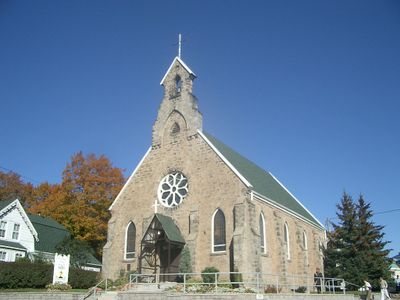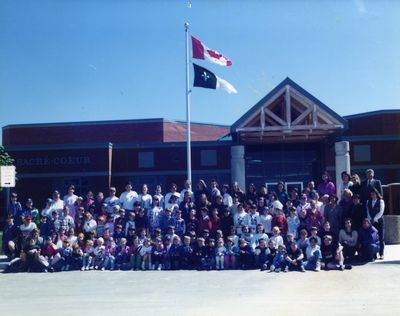
Notre Histoire, Halton Hills (English)
Our History
Pages
WelcomeOur HistoryNotre Dame De BeauregardParoisse Sacré-CœurL’École Sacré-CœurOur FutureReferences
Although the history of the Francophone community can be dated as far back as the 1800s, it wasn’t until the mid-1900s, with the opening of the farm, Notre Dame de Beauregard, that Francophones began to make a name for themselves in Georgetown.
In 1947, Father Clovis Beauregard and his niece, Therese St. Jean, moved to Georgetown and began a farm that took in orphaned boys from Quebec. The boys were given a chance to both work and earn an education on the farm. Once they graduated, some would move away while others remained in the area.
Aside from the farm, the first small scale Francophone migration to Georgetown occurred from 1961-1965 when French Acadians from New Brunswick were sponsored by Therese St. Jean. This initial migration then led to what has been called a “snowball” of more Francophone families coming to the area.
In the 1970s, the Francophone population in Georgetown remained fairly constant, as the numbers of Francophones coming in were about the same as those leaving. Also in the 1970s, there was an uptick of non-Acadians moving to Georgetown. Instead, the majority came from Northern Ontario, Eastern Ontario, Quebec, and some from Southern Ontario, such as Windsor. By 1976 to 1977, the Francophone population was about 50% Acadian and 50% of other French origins.
At the time that the Francophone first began arriving in Georgetown, its population was primarily English. As expected of the times, there was some tension between the two groups initially. Many of the Anglophones felt that their own community was being disrupted, whether because they didn’t like the idea of having a different group in town, or because of various changes that occurred.
Many of the early Francophone arrivals from New Brunswick were not well-off, and when they arrived in Georgetown, had a hard time finding work as they spoke little English. Many continued to live in poverty. The Anglophones didn’t like their different lifestyles, and cultural differences caused many prejudices to surface. As the Francophone population grew, they began to make moves within the community, such as demanding their own separate school or starting their own church. This again didn’t always sit well with the English.
However, as time passed, tensions between the two communities began to ease. By the 1970s, there was much more integration and mixing between them. Events such as French Week (such as that in March 1982) were held to celebrate French culture, but also helped promote better understanding among all Georgetown residents.
By 1991, there were an estimated 1200 Francophones in the Georgetown area. The Francophone community has been of special interest to local newspapers , national media such as CBC , and to academics alike. A number of studies have examined the Francophone community, with special attention to French-English relations and cultural preservation.
Indeed, Francophone culture and pride remain strong in the community today.
In 1947, Father Clovis Beauregard and his niece, Therese St. Jean, moved to Georgetown and began a farm that took in orphaned boys from Quebec. The boys were given a chance to both work and earn an education on the farm. Once they graduated, some would move away while others remained in the area.
Aside from the farm, the first small scale Francophone migration to Georgetown occurred from 1961-1965 when French Acadians from New Brunswick were sponsored by Therese St. Jean. This initial migration then led to what has been called a “snowball” of more Francophone families coming to the area.
In the 1970s, the Francophone population in Georgetown remained fairly constant, as the numbers of Francophones coming in were about the same as those leaving. Also in the 1970s, there was an uptick of non-Acadians moving to Georgetown. Instead, the majority came from Northern Ontario, Eastern Ontario, Quebec, and some from Southern Ontario, such as Windsor. By 1976 to 1977, the Francophone population was about 50% Acadian and 50% of other French origins.
At the time that the Francophone first began arriving in Georgetown, its population was primarily English. As expected of the times, there was some tension between the two groups initially. Many of the Anglophones felt that their own community was being disrupted, whether because they didn’t like the idea of having a different group in town, or because of various changes that occurred.
Many of the early Francophone arrivals from New Brunswick were not well-off, and when they arrived in Georgetown, had a hard time finding work as they spoke little English. Many continued to live in poverty. The Anglophones didn’t like their different lifestyles, and cultural differences caused many prejudices to surface. As the Francophone population grew, they began to make moves within the community, such as demanding their own separate school or starting their own church. This again didn’t always sit well with the English.
However, as time passed, tensions between the two communities began to ease. By the 1970s, there was much more integration and mixing between them. Events such as French Week (such as that in March 1982) were held to celebrate French culture, but also helped promote better understanding among all Georgetown residents.
By 1991, there were an estimated 1200 Francophones in the Georgetown area. The Francophone community has been of special interest to local newspapers , national media such as CBC , and to academics alike. A number of studies have examined the Francophone community, with special attention to French-English relations and cultural preservation.
Indeed, Francophone culture and pride remain strong in the community today.



